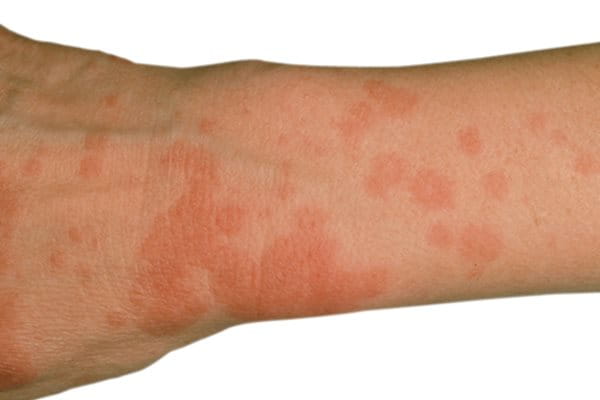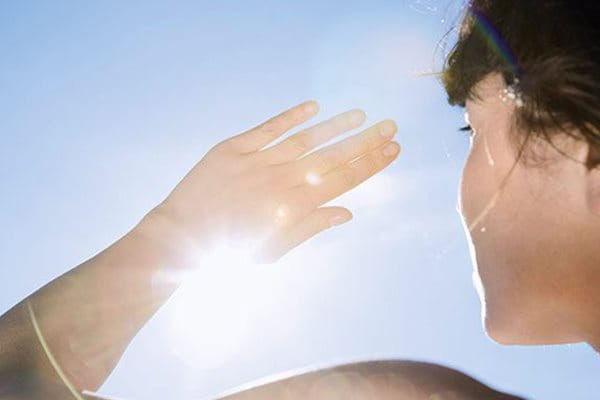Sun allergies are very common, especially among young women and people with fair skin. The most common form of sun allergy is Polymorphous Light Eruption (often abbreviated to PLE). This article looks at the causes and symptoms of PLE and other reactions to the sun and explains how to prevent sun allergies and protect allergy-prone skin from the sun.
What is a sun allergy?
A sun allergy, also known as photodermatitis, is an immune system reaction to sunlight, most often in the form of an itchy red rash. The most common form of sun allergy is Polymorphous Light Eruption (PLE).
What is Polymorphous Light Eruption?


The symptoms of Polymorphous Light Eruption (commonly abbreviated to PLE) range from a mild, bumpy rash through to skin redness, pustules and blisters. Whatever the visual symptoms, skin is nearly always itchy. Symptoms tend to develop a day or two after being in the sun and are normally on the underside of the arms and the chest – facial skin can be affected, but this is less common.
PLE is most likely to effect young women and people with fair skin. It usually comes back each year when skin is first exposed to strong sunshine but the causes are not limited to direct exposure: light passing through windows can also trigger the condition. The rash normally clears within a week if you stay out of the sun but, if exposure continues, symptoms may worsen.
What causes PLE?
The causes of PLE are not fully known but research suggests that it may be inherited. When people have the underlying condition, their immune identifies and reacts against areas of skin altered by the sun producing a rash:

- UV rays – especially long wavelength UVA rays (which trigger PLE in 80% of people affected) – penetrate deeply into the skin where they can damage cells.
- UV-induced free radicals form highly reactive chemical compounds which cause oxidative stress, resulting in cell damage.
- People with PLE have an impaired cellular defense which reduces their skin’s ability to handle these free radicals.
- On exposure to the sun their skin responds by over activating its immune function, resulting in red and inflamed skin.
You can find out more about how sun affects skin in general in How do UVA, UVB and HEVIS light rays affect skin.
How can I prevent PLE?
Sun allergies can be prevented, or symptoms reduced, by careful sun protection: limit your exposure to the sun, avoid the peak hours when sun is at its most intense, wear protective clothing and use a sun protection product that offers high or medium protection and that has been specially formulated for your skin type and condition.
You can read more about how to minimize the risks of exposure, how to choose the right sun protection products for your skin and how best to apply them in How should I protect my body from the sun?


Eucerin Sun Creme-Gel Sun Allergy Protect SPF 50 and SPF 25 is a light, non-sticky cremegel sunscreen that has been specially formulated for skin prone to sun-induced allergies such as PLE. Eucerin’s Advanced Spectral Technology combines broadband and photostable UVA/UVB filters1 with Licochalcone A to neutralize free radicals caused by UV and HEVIS light. The formula also contains Alpha-Glucosylrutin which helps to prevent sun-induced allergies and is unperfumed to minimize the risk of skin irritation. It can be used on both your face and body.
For those with severe PLE, a dermatologist may recommend a topical steroid cream or a course of prophylactic light therapy (also known as ‘photo hardening’ or `desensitization`). This treatment gradually exposes skin to UV rays in order to build up a tolerance of sunlight.
Those with milder PLE often find that the condition gradually improves over time. It may even disappear completely.
- Meeting the high standards for UVA and UVB protection defined by Cosmetics Europe. The levels of UVA protection are higher than the EU recommendation.
Our brand values

We deliver a holistic dermo-cosmetic approach to protect your skin, keep it healthy and radiant.

For over 100 years, we have dedicated ourselves to researching and innovating in the field of skin science. We believe in creating active ingredients and soothing formulas with high tolerability that work to help you live your life better each day.

We work together with leading dermatologist and pharmacist partners around the world to create innovative and effective skincare products they can trust and recommend.



